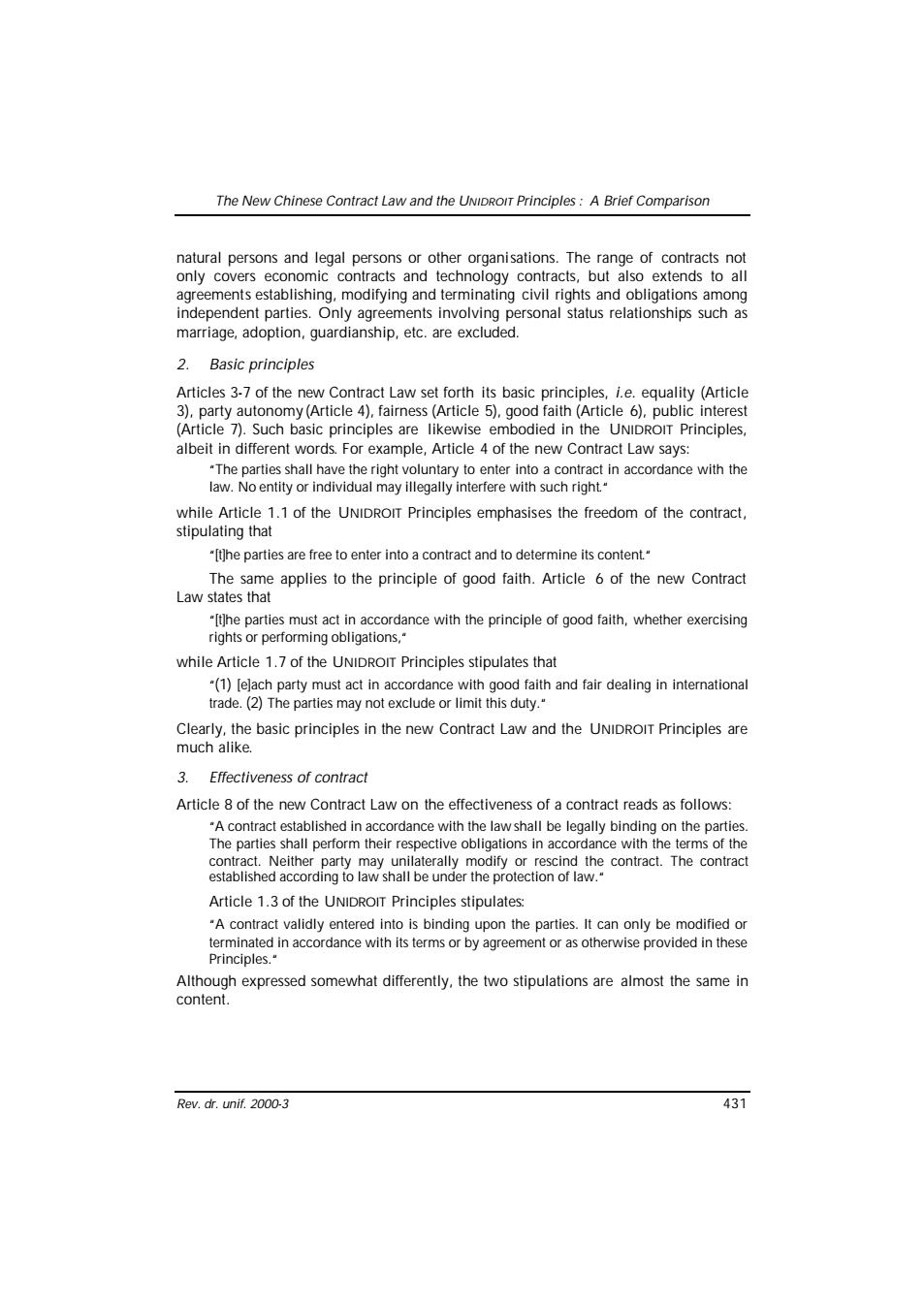正在加载图片...

The New Chinese Contract Law and the UNIDROIT Principles:A Brief Comparison natural persons and legal persons or other organisations.The range of contracts not only covers economic contracts and technology contracts,but also extends to all agreements establishing,modifying and terminating civil rights and obligations among independent parties.Only agreements involving personal status relationships such as marriage,adoption,quardianship,etc.are excluded. 2. Basic principles Articles 3-7 of the new Contract Law set forth its basic principles,i.e.equality (Article 3),party autonomy (Article 4),fairness (Article 5),good faith (Article 6),public interest (Article 7).Such basic principles are likewise embodied in the UNIDROIT Principles, albeit in different words.For example,Article 4 of the new Contract Law says: "The parties shall have the right voluntary to enter into a contract in accordance with the law.No entity or individual may illegally interfere with such right" while Article 1.1 of the UNIDROIT Principles emphasises the freedom of the contract, stipulating that "[t]he parties are free to enter into a contract and to determine its content." The same applies to the principle of good faith.Article 6 of the new Contract Law states that "[t]he parties must act in accordance with the principle of good faith,whether exercising rights or performing obligations," while Article 1.7 of the UNIDROIT Principles stipulates that "(1)[elach party must act in accordance with good faith and fair dealing in international trade.(2)The parties may not exclude or limit this duty." Clearly,the basic principles in the new Contract Law and the UNIDROIT Principles are much alike. 3. Effectiveness of contract Article 8 of the new Contract Law on the effectiveness of a contract reads as follows: "A contract established in accordance with the law shall be legally binding on the parties. The parties shall perform their respective obligations in accordance with the terms of the contract.Neither party may unilaterally modify or rescind the contract.The contract established according to law shall be under the protection of law." Article 1.3 of the UNIDROIT Principles stipulates: "A contract validly entered into is binding upon the parties.It can only be modified or terminated in accordance with its terms or by agreement or as otherwise provided in these Principles." Although expressed somewhat differently,the two stipulations are almost the same in content. Rev.dr.unif.2000-3 431The New Chinese Contract Law and the UNIDROIT Principles : A Brief Comparison Rev. dr. unif. 2000-3 431 natural persons and legal persons or other organisations. The range of contracts not only covers economic contracts and technology contracts, but also extends to all agreements establishing, modifying and terminating civil rights and obligations among independent parties. Only agreements involving personal status relationships such as marriage, adoption, guardianship, etc. are excluded. 2. Basic principles Articles 3-7 of the new Contract Law set forth its basic principles, i.e. equality (Article 3), party autonomy (Article 4), fairness (Article 5), good faith (Article 6), public interest (Article 7). Such basic principles are likewise embodied in the UNIDROIT Principles, albeit in different words. For example, Article 4 of the new Contract Law says: “The parties shall have the right voluntary to enter into a contract in accordance with the law. No entity or individual may illegally interfere with such right.“ while Article 1.1 of the UNIDROIT Principles emphasises the freedom of the contract, stipulating that “[t]he parties are free to enter into a contract and to determine its content.“ The same applies to the principle of good faith. Article 6 of the new Contract Law states that “[t]he parties must act in accordance with the principle of good faith, whether exercising rights or performing obligations,“ while Article 1.7 of the UNIDROIT Principles stipulates that “(1) [e]ach party must act in accordance with good faith and fair dealing in international trade. (2) The parties may not exclude or limit this duty.“ Clearly, the basic principles in the new Contract Law and the UNIDROIT Principles are much alike. 3. Effectiveness of contract Article 8 of the new Contract Law on the effectiveness of a contract reads as follows: “A contract established in accordance with the law shall be legally binding on the parties. The parties shall perform their respective obligations in accordance with the terms of the contract. Neither party may unilaterally modify or rescind the contract. The contract established according to law shall be under the protection of law.“ Article 1.3 of the UNIDROIT Principles stipulates: “A contract validly entered into is binding upon the parties. It can only be modified or terminated in accordance with its terms or by agreement or as otherwise provided in these Principles.“ Although expressed somewhat differently, the two stipulations are almost the same in content